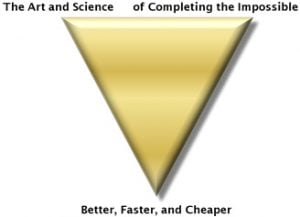In project management workshops, I often kick off each class with questions for table-teams to answer as a group, then report to the class:

1. What is your definition of a project?
2. How does a project differ from other work?
3. What is project management?
I began this practice long before Max Wideman’s PMBOK, and Duncan’s PMBOK® Guide. Despite efforts of practitioners and professional associations, there remains a wide variety of answers to my third question, What is project management?
After the teams report, I proclaim that each team’s answers were excellent. I also say, that, at the end of the class, I will share my answer to that third question, which is in the graphic at right.
I will parse this simple twelve-word sentence, and see if we can add any new insights for you, our reader.
The Art and Science …
Clearly today, project management is both an art and a science. In the 1970s and 80s, most people (and most authors and consultants) focused just on the scientific part. That included the formulas, the processes, and the tools. For most, that ‘easy part’ was only occasionally successful, and too-often produced sub-optimal results.
Forty years ago, very few understood that most-important part about art. The art includes leadership; team-building; interpersonal skills; creativity; negotiation skills; effective communications; integrity; results orientation; influencing others; managing change; strategy; power; culture and values; and other competences you can now find in IPMA’s Individual Competence Baseline.
As many now understand, your personal style and experience affects your effectiveness in mastering—and demonstrating—both sets of the competences that contribute to project management as a science, and as an art.
… Of Completing the Impossible …
Of course this was impossible! Projects change the status quo, and create something new. If it was possible, it would already exist! One reason I shared this definition of project management at the end of the class (in addition to referring back to participants’ answers during the class) is that by the class end, we have discussed all the factors and key insights that make this statement possible, and especially meaningful.
I understand that you may still be arguing, in your mind, about this part of my answer. This is my intent—to stretch practitioners’ reality beyond your limiting beliefs.
But there is another part of this phrase: completing. Finishing—and proving you have done so! Closure is not just for the project manager; it is also for your team, for your customers, for your managers, and for the beneficiaries of your efforts. And, in all my PM methods, for over 37 years, Closure always comes after demonstrating—and verifying—benefits realization. The experience of successful-project closure is a high point for all stakeholders, and should be well worth celebrating!
… Better, Faster and Cheaper!
This phrase is similar to the old-style project manager’s line, “good, fast or cheap, pick any two.” But today’s productive project manager’s approach is more effective than that uninformed statement. For example, I use more than three success-factors in my practice, and in the projects for which I do performance coaching.
Note the sequence in the phrases: Better comes first. Which raises a question, how do you measure it? You don’t! Your managers and customers measure the quality, and you’d better understand how they do so before you start working on the project. When do YOU usually learn how to measure the quality of the product, and of the project process that delivered it?
Again, faster than what? Faster than expected? Than the competition? Than the deadline? Being very careful not to get into rant mode, competent project managers never have deadlines: They set due dates. Here is an answer to the faster than what question: Faster than a project with this measured scope would normally require. And, these are the factors, including choice of talent, timely management actions, and appropriate customer involvement, that I need, to achieve that goal. Given these actions on your part, I can deliver business results faster than you believe possible. Without compromising, and perhaps improving, measured quality.
The word cheaper has poor connotations; most people assume that cheaper is the opposite of quality. With less-effective project managers, sponsors, and resource managers, that is often the net result. We use the word cheaper, because the true term in project performance measurements, ‘cost-effective,’ fails to add a catchy troika of words. Better, faster and cheaper, is less-cumbersome than ‘better, faster and more cost-effective.’
Change Agents Seize the Day!
The same factors that help to deliver a project faster, plus the ability to selectively defer or delay some project scope, can deliver a more cost-effective project. Funding flexibility and full-time assignment of core project team members are additional smart ways to increase project cost-effectiveness.
Note the word and in this last phrase: The word in my definition is not or. Which word is in your definition? You can have it all.
Those who understand this definition of project management–and who practice the competences needed to consistently demonstrate that definition, are the true change-agents of our World!
